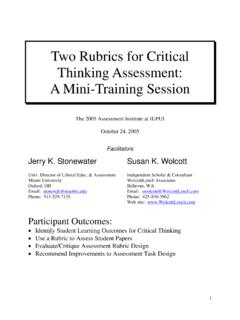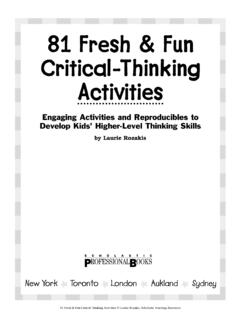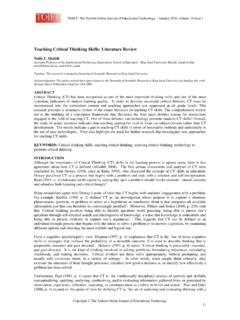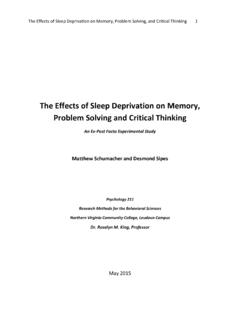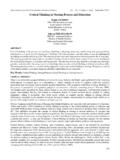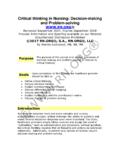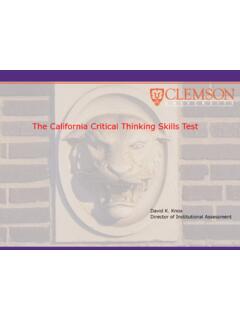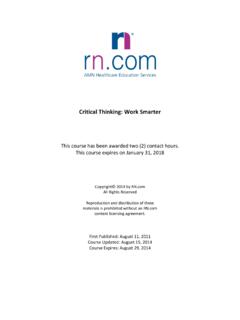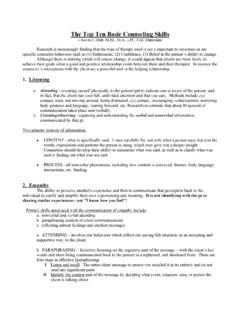Transcription of CRITICAL THINKING: CONCEPTUAL FRAMEWORK
1 REVIEW PAPERS. CRITICAL thinking : CONCEPTUAL FRAMEWORK . By PADMANABHA C. H. Assistant Professor, Srinivas College of Education, Mangalore, Karnataka, India. Date Received: 31/01/2018 Date Revised: 23/03/2018 Date Accepted: 15/04/2018. ABSTRACT. CRITICAL , Criticism , and Critic all come from the age-old Greek word Kritikos , meaning able to authorise, discern, or decide. In contemporary English, a Critic is someone whose job is to make appraise judgements, for example, about films, books, music, or food. It means giving a fair and unprejudiced opinion of something. The same as for Education is concerned, CRITICAL thinking is a cognitive activity associated with using mind. CRITICAL thinking is the ability to transfer knowledge learned from certain disciplines to other cognitive areas. CRITICAL thinking was connected with supporting suspicious thoughts along with developing individual thoughtful skills , such as logical reasoning and personal judgement. According to John Dewey, thinking is the natural propensity of mind, day dreaming, building of acropolis in the air are the examples for thinking , in a random sense.
2 John Dewy further says to become analytical thinker or to think critically that reflections is more important. Piaget say thinking is based on experience . Intelligence, is the product of the innate potential interacting with the environment and young children knows more that he can verbalise. Development has to do with general mechanisms of action and thinking . Vygotsky suggests that social interaction plays a fundamental role in the process of cognitive development. CRITICAL thinking is needed for CRITICAL analysis, while CRITICAL pedagogy goes beyond it claiming that societal instructions producing and implementing knowledge, and related ideologies have to be questioned and transformed. Paul goes on to argue that an ample conception of CRITICAL thinking must go away from skills , and include the dispositions and personality traits relevant to the use and appreciation of those skills . Keywords: CRITICAL thinking , John Dewey's Views, Piaget's Views, Vygotsky's Views, CRITICAL Pedagogy Views.
3 INTRODUCTION 2017). During the acquisition of CRITICAL thinking skills and The terms CRITICAL , Criticism , and Critic all come from processes, the mind and body of the students must be the ancient Greek word Kritikos meaning able to judge, active and open for scientific analysis. distinguish or choose. In modern English, a Critic is CRITICAL thinking was associated with encouraging a somebody whose job is to create evaluative judgements, suspicious attitude along with developing individual for example, on films, books, music, or food. It means reflective skills , such as logical reasoning and personal expressing a fair and unprejudiced opinion on something. judgement. At the same time, there was an argue on As far as education is concerned, CRITICAL thinking is a whether CRITICAL thinking was the general ability that could cognitive activity related to using the mind. Learning to think be taught as a separate subject or whether it needed to be in vital, diagnostic, and evaluative ways means using developed during the process of accepting a specific mental processes, such as attention, categorisation, discipline or body of knowledge.
4 The present research selection, and judgement. CRITICAL thinking is the capacity highlights the important theoretical views of CRITICAL thinking to transmit knowledge learned from certain disciplines to concept in the discipline of education (Garrison, 2016). other cognitive areas. It involves not only the attainment of 1. Definitions of CRITICAL thinking knowledge, but also vigorous learning, a kind of evaluative Dewey in 1934, defined CRITICAL thinking as Active, learning and operation of knowledge effectively (Santos, persistent, and careful consideration of a belief or i-manager's Journal on Educational Psychology, Vol. 11 l No. 4 l February - April 2018 45. REVIEW PAPERS. supposed form of knowledge in the light of grounds which reflective thinking (Fisher, 2011). He said that the whole support it and the consequences to which it leads (Jiang, thing that comes to mind and go through our heads is 2017). called thinking . To think of a thing is to be just aware of it. We Paul in 1988 found that CRITICAL thinking is the ability to can think of such things as we do not openly see, hear, reach sound conclusion based on observation and smell, or taste.)
5 The meaning is further limited to beliefs that information (O' Donnell et al., 2011). rest upon some kind of verification or proof. In a thin sense, thinking signifies the whole thing that goes in our heads or Facione in 1990 saw CRITICAL thinking to be purposeful, self- that goes in our minds . According to John Dewey, regulatory judgement, which results in understanding, thinking is the normal inclination of the mind, day investigation, evaluation, and inference, as well as an dreaming, building of palace in the air are the examples for explanation of the evidential, abstract methodological, thinking , in a random sense. He added to become an criteriological, or contextual considerations upon which analytical thinker or to think critically reflections are more that judgement is (Mentor, 2016). important. Reflection involves not only a sequencing of Ennis in 2002 defined it as CRITICAL thinking is meditative ideas, but also a product, a consecutive ordering in such a and sensible thinking that is focused on deciding what to way that each determines the next as it is a proper believe or do (Fisher, 2011).
6 Outcome. While each in turn leans back on its Glaser in 1941 thought CRITICAL thinking as an attitude of predecessors, the successive portions of a reflective being disposed to consider in a thoughtful way the thought grow out of one another and support one another;. problems on subjects that come within the range of one's they do not come and go in a combination. CRITICAL experiences (Lin, 2018). thinking is essentially a vigorous process, one in which we Mulnix is in 2010 CRITICAL thinking includes a commitment to think things though oneself. To raise questions and find using reason in the formulation of our beliefs (Han, 2015). relevant information, CRITICAL thinking attaches huge All the above definitions indicate that CRITICAL thinking gives importance to reflections; reflections based on perceiving due thought to prove the situation of judgement, the things, ideas, or concepts. Hence, John Dewy said that appropriate criterion for making the relevant methods or skillful reasoning is important for CRITICAL thinking .
7 Techniques for forming the judgement, and the applicable He suggested that CRITICAL thinking had both cognitive and theoretical construct for understanding the problem and emotional constituent. Hence, students must be trained to the question at hand. CRITICAL thinking employs not only examine, thrust questions, and reflect on what they have reason, but also broad intellectual conditions, such as learned; cynicism insightful and reflection are essential. precision of thought, sincerity, accuracy, precision, Examining a difficulty to find a solution, think about why an relevance, and significance. individual is not flourishing, and learning from one's own Most of the human decisions are associated with either failures. CRITICAL thinking involves students in doing things, acceptability or denial of a particular argument, idea or and thinking about the things they are doing. concept based upon inferences. The human mind infers Criteria for Reflection from deductive, inductive, and evaluative thinking .
8 For 1) Reflection is an intelligence process that moves a learner CRITICAL thinking skills , three cognitive skills are basic; people from one understanding to the next with broad who think critically again and again attempt to live understanding of its associations and relations to other rationally, reasonably, and emphatically. experiences and ideas. Reflections act like a thread and 2. John Dewey's Views on CRITICAL thinking help in the continuity of learning, and ensures the The American philosopher, psychologist, and educator, development of the individual and ultimately, the society. John Dewey is extensively regarded as the father of Reflection is an orderly rigorous, well-organised way of contemporary CRITICAL thinking tradition. He called it thinking with its roots in scientific investigation (Jacobson, 2012). 46 i-manager's Journal on Educational Psychology, Vol. 11 l No. 4 l February - April 2018. REVIEW PAPERS. 2) Reflection needs to happen in the centre of the necessarily reflective unless one is critically thinking about population in interaction with the others.
9 The problem, information or data, personal experiences, 3) Reflection requires attitudes that value the individual and and interpretation of available information. CRITICAL thinking academic growth of oneself and others. involves reflective thinking , if engaged in reflective judgement. Reflective judgements promote the The second kind of thinking is invention. Invention helps to development of reflective thinking , but rely upon CRITICAL recognize facts, it is called thoughts. thinking to bring about these reflective processes. CRITICAL The following are the six phases of reflection. thinking is affected by decision making criteria, and An experience complex problem solving. It is reliant upon skillful thinking Unstructured explanation of the experience and good judgement is self-correcting. Identification of the problem(s) or question(s) that arise CRITICAL thinking involves identifying and demanding out of the experience assumptions, which underlie faith, justifying ideas and Generating promising explanations for the problem(s) actions, judging the rationality of these justifications, and or question(s) posed analysing of arguments.
10 Reflective judgements and CRITICAL thinking do not occur in separation from a complex Bifurcate the explanations into fault blown hypotheses problem, but are connected with finding the solution to the Experimenting or testing the selected hypothesis problem. Reflective thinking requires an evaluation of Reflection, according to Dewey, is more than just casual speculation beliefs and hypotheses against data. thinking or passive introspective thoughts about something. Knowledge researches findings and interpretations, and It is a complex and intentional intellectual activity that judgements are made as a result of identifying and generates learning from experience (Wang, 2016). It can weighing up various views and understanding of these be largely conceived. It is more than simply a matter of issues. Reflective judgements involve purposeful thought direct participation in events, for example, introverted and deliberation on the knowable elements of the problem reading of a book or discussion with others.










